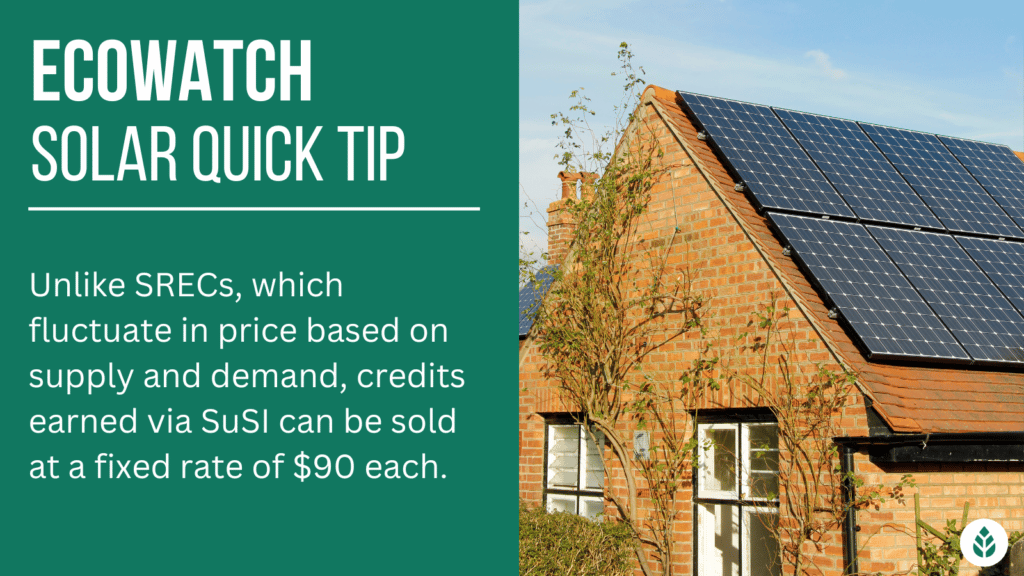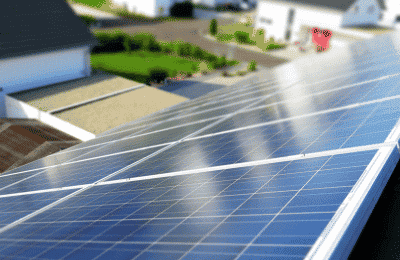
New Jersey Solar Incentives (Rebates, Tax Credits & More in 2024)
In this complete guide to solar benefit programs in New Jersey, you’ll learn:
- What financial incentives are available to solar customers in New Jersey?
- Do the solar perks available in New Jersey make going solar more affordable?
- What are the most valuable solar benefit programs available in New Jersey?
Each product and or company featured here has been independently selected by the writer. You can learn more about our review methodology here. If you make a purchase using the links included, we may earn commission.
Do New Jersey Solar Incentives Make It Affordable for Homeowners to Convert to Solar?
Converting to solar in New Jersey is expensive, but the incentives available do help make solar adoption more affordable overall.
The average cost to install a solar energy system in New Jersey is around $23,590. This is the typical upfront cost for solar, which assumes a per-watt price of $3.37 — which is above the national average — and the average local system size of 7 kilowatts (kW) — which is smaller than what most U.S. solar customers need.
This total initial cost is a few thousand dollars cheaper than what most Americans pay due to the below-average system size required to offset the relatively low electric bills in the area. Still, paying $23,590 for solar is prohibitively expensive for many New Jersey residents.
Thankfully, New Jesey has a Renewable Portfolio Standard (RPS) goal to produce 50% of its energy from renewable energy sources by 2030. To help reach that goal, it offers more incentives for solar conversion than most states, which, in turn, helps reduce the effective cost of solar panels.

Blue Raven Solar
Pros
- Industry-leading in-house financing
- Competitive pricing
- Excellent reputation
Cons
- Doesn't offer solar batteries (coming 2022)

Momentum Solar
Pros
- Great warranty coverage
- Concierge service ensures steady communication
- Representatives are experts on local policies
Cons
- Slightly limited service offerings
- Only available in 11 states

Trinity Solar

Regional Service
Average cost
Pros
- Many financing options
- Family-owned and -operated
- Makes charitable contributions
- Relatively short workmanship warranty
Cons
- Limited service area
In order to help its residents make the switch to solar, New Jersey offers the following helpful incentives:
| Solar Benefit Program in New Jersey | Incentive Type | Description | Occurrence | Estimated Dollar Amount You Can Receive |
| Federal Solar Investment Tax Credit (ITC) | Federal | This credit gets applied to your income tax burden for the year you install your PV system. It’s for 30% of your system value | One-time: This credit gets applied once when you file your taxes after going solar. However, any remaining credit can be carried forward for five years | $7,077 on average in NJ |
| Successor Solar Incentive (SuSI) Program | State | This program provides one credit for every 1,000 kilowatt-hours (kWh) your system generates. You can sell the credits for a profit | Ongoing: This program provides credits for total energy production for 15 years from installation | $10,200 over 15 years, on average in NJ |
| New Jersey Solar Sales Tax Exemption | State | This exemption reduces your upfront system costs by waiving sales tax on all PV equipment | One-time: This exemption gets applied once when you purchase your solar panel system. | $1,562 on average in NJ |
| New Jersey Solar Property Tax Exemption | State | This exemption prevents your property taxes from increasing due to the home value bump provided by your home solar system | Ongoing: Your property taxes will remain unaffected by the value added by your system for the life of the equipment | Varies based on the size and cost of your system and on your local property tax rate |
| Net Energy Metering | Local | Credits you for energy you produce and send to the grid instead of using. The credits can reduce future bills when energy needs overshadow production | Always in Effect: The perks from net energy metering will remain in effect for the life of your system. All excess energy will always be credited to your account | Varies based on your energy needs, the size of your system and more |
What Do New Jerseyans Need to Know About the Federal Solar Tax Credit?
The federal tax credit is the most substantial solar benefit program available to New Jersey residents. It’s a credit for 30% of your entire system cost, including panels, inverters, batteries, electric vehicle chargers and the solar panel installation labor. In New Jersey, where the typical system totals $23,590, most residents see a credit of approximately $7,077.
We’ll get into the reasoning behind this later, but we believe that solar batteries will become more of a necessity than a luxury in the coming years in New Jersey. If that happens, it’s nice to know that the ITC applies to those as well. With batteries adding between $10,000 and $20,000 to your installation costs, on average, that’s an additional $3,300 to $6,600 in credits that it could provide.
That total amount gets credited to the income taxes you owe for the year you install your system. If you can’t take the entire credit, you can roll over any unused amount for up to five years. That means you can still take the full credit as long as you owe an average of $1,415 per year with panels alone, or around $2,405 per year with batteries.2
The federal credit was initially offered in 2005 for 30% of your system value, but that credit rate dropped in 2022 to 26%. It was scheduled to drop again in 2024 to 22%, but the federal government passed the Inflation Reduction Act in September of 2022 to improve the credit. The new rate schedule is as follows:
- 30% for all systems installed between 2022 and 2032 — this retroactively includes systems installed before September in 2022
- 26% for all systems installed in 2033
- 22% for all systems installed in 2034
- The credit will no longer be available beginning in 2035
How New Jersey Residents Can Claim the Federal Credit
Claiming the federal credit couldn’t be much simpler. It just requires a single form filed along with your taxes for the year you install your system. You can follow the steps below to make sure you take advantage of this perk.
- Step 1: Go to the IRS’s website and print out form 5695.
- Step 2: Fill out the form when you’re ready to file your income taxes. You’ll need some basic information, like contact details for your solar installer and some based system information. Everything you need should be included in the documents you receive from your solar installer. This step should only take a few minutes if you have the required information handy.
- Step 3: File the IRS form with your taxes, or have your accountant include it in your filing.
Alternatively, if you’re using TurboTax or HR Block to file your taxes, you can follow the prompts in the software to confirm you’ve installed solar equipment.
EcoWatch’s Opinion on the Federal ITC in New Jersey
Although some of the other solar benefit programs in New Jersey are outstanding, the federal credit is still our pick for the most impactful and beneficial.
The credit averages over $7,000 for solar customers, and applying for the incentive program takes just a few minutes. Additionally, while it may not have the highest expected rate of return in the Garden State — since the SuSI program often yields greater financial benefits — the perk kicks in within a year of going solar and sometimes in just a few months.
It’s important to note that this is not a solar rebate, so you won’t get money back from the federal government. Instead, the credit gets applied to the income taxes you owe. While it can effectively reduce your solar project cost, you’ll only be able to take the credit if you owe money when you file your taxes.
If you don’t expect to owe at least $1,415 per year over the next five years for your income taxes, then you won’t be able to take the full credit.
You should also note that this solar incentive program is only available to customers who pay in cash or via a solar loan. It’s not available for leases or power purchase agreements (PPAs).
Watch Below: Learn What New Jersey’s TREC Program Is And How They Differ From SRECs
What You Should Know About the Successor Solar Incentive (SuSI) Program in New Jersey
The SuSI program — also called the Administratively Determined Incentive (ADI) program and the SREC-II program — is similar to the Solar Renewable Energy Credit (SREC) programs in other states. In fact, the program replaced New Jersey’s now outdated SREC and TREC (Transitional Renewable Energy Certificate) programs.
The SuSI program guarantees one energy credit for every 1,000 kWh (1 megawatt-hour/mWh) you generate with your solar panel system. Unlike SRECs, which fluctuate in price based on supply and demand, credits earned via SuSI can be sold at a fixed rate of $85 each, as of January 2024.1
The typical New Jersey solar power system is around 7 kW and is expected to generate approximately 8,400 kWh of solar electricity per year, or 8.4 megawatt-hours. That’s equivalent to eight energy credits, which can be sold for $680 per year. Over the 15 years this program lasts, that’s a total of $10,200 in credit value.
Your actual return will likely be a bit lower due to panel energy efficiency degradation, but it should be relatively close to this number. Panels with a lengthy efficiency warranty will see the most value out of this perk.
How to Claim the SuSI Program Benefits in New Jersey
The SuSI program does have a limited number of applications it will process and New Jersey homeowners it can benefit. You need to make sure you get your application in as quickly as possible when you decide to convert to solar to get the maximum benefit. You can follow the steps below to apply.
- Step 1: Go to the New Jersey’s Clean Energy Program website to begin the application process.
- Step 2: Fill out the application. You’ll need quite a bit of information to apply, including your utility provider account number, contact information for your solar installation company, system capacity and cost information and more.
- Step 3: Wait for approval.
- Step 4: You can monitor your account to confirm that your credits are accruing after you’re approved.
EcoWatch’s Opinion on the SuSI Program in New Jersey
The SuSI program requires an application process, so you’ll have to dedicate some time and energy to enroll. However, the process is relatively short and shouldn’t take more than an hour or so to gather the necessary information and apply.
Once you apply and are approved, you don’t have to do anything to accrue credits and get reimbursed for your energy production. Especially given that the average New Jersey system can generate credits valued at over $10,000 over the life of the equipment, this incentive is one of the most crucial ones to take advantage of.
The only real downside to this perk is that the spots available in the program are limited.
What You Should Know About the Tax Exemption for Solar Sales Tax in New Jersey
The New Jersey state government helps reduce the upfront cost by waiving state sales tax on all solar equipment. This includes the equipment and the labor to install it.
With an average system price of $23,590 and a sales tax rate of 6.625%, most homeowners will save around $1,562 on their installations using this perk.2 If you install batteries as well — which we believe will be necessary in future if net metering disappears as it has been in other states — you’re looking at average savings of $2,411.
How to Claim New Jersey’s Sales Tax Exemption for Solar Equipment
The exemption for sales tax is automatic in New Jersey, so you don’t have to worry about filing any paperwork to take advantage of it. Your system estimate won’t include sales tax, nor will your final price.
EcoWatch’s Opinion on the Exemption for Sales Tax in NJ
Exemptions for sales tax are a great way for states to reduce the financial burden of converting to solar and make renewable energy more appealing and accessible overall. We love to see sales tax exemptions for PV equipment, and the fact that it’s automatic in the Garden State makes it all the more enticing.
What You Should Know About the Solar Property Tax Exemption in New Jersey
Solar panels are expected to bump up your property value by around 4.1%.3 Normally, any home improvement that positively affects your home value will also cause your property taxes to go up.
This exemption prevents that from happening with solar equipment. This perk doesn’t provide savings upfront, but it does reduce the long-term cost of solar adoption.
The exact amount you’ll save with this incentive will vary. Given the typical value of $23,590 and the local property tax rate of 2.26% — which is above the national average — this perk provides an average tax savings of $533 per year. Over the 20 years your system is expected to hold value, that’s a total savings of $10,662.
Keep in mind that this total assumes no panel depreciation, so your actual long-term savings will be somewhat lower.
How to Claim the Property Tax Exemption in New Jersey
Much like the exemption for sales tax, this exemption doesn’t require any action on your part. Your tax assessor will automatically exclude the value of your PV system when determining your property taxes.
EcoWatch’s Opinion on New Jersey’s Solar Exemption for Property Taxes
Any incentive that requires little to no work for the solar customer and provides some financial benefit is a major plus in our book. Since you don’t have to do anything to take the exemption for property taxes, and you save thousands on your property taxes as a result, this perk is an outstanding one, in our opinion.
Net Energy Metering in New Jersey
Net metering is a billing policy that credits you for any energy you generate with your panels above and beyond what you consume at any given moment. The electricity that you pass to the grid gets “banked,” and you can call on that banked energy at a later date if your consumption exceeds your solar production, like at night or on cloudy days.
The New Jersey Board of Public Utilities (NJ-BPU) mandates net energy metering for all utility companies. The BPU also mandates that every kWh sent to the grid is credited at the full retail rate, which is outstanding. That means each kWh you send can offset one kWh you pull from the grid in the future. This is available for individual solar customers and community solar participants.
At the end of the year, any excess credits are reconciled at the avoided cost rate, so it is beneficial to have a system that is appropriately sized for your home. Keep in mind that the BPU will exclude you from the program if your system is considered “oversized” for your property. It’s not clear about what this means, but a reputable, local solar installer should be able to help you meet the requirements.
It’s important to keep in mind that net energy metering policies have been changing across the country, usually to the detriment of the solar customer. Credit rates have been getting less beneficial, and some states are abandoning the program altogether. Most notably, California rolled out NEM 3.0 in 2024, which decreased the credit rate by around 75%. This was a huge hit to the local solar market, and since it occurred in the most solar-friendly state, we believe this trend is going to continue in other states, as well.
There is no plan in place for this to happen in New Jersey, but it’s always possible that the program will change. In fact, we expect it to get downgraded or even disappear in the coming years.
How to Enroll in Net Energy Metering in New Jersey
Net energy metering (NEM) is another automatic perk in New Jersey that typically requires no effort on your part to enroll. However, there are a few things you can do to make sure NEM takes effect automatically.
- Step 1: Contact your solar or utility provider to make sure your home is equipped with a bi-directional meter. This is required for interconnection. You should be able to get one installed at no installation cost to you if you don’t already have one.
- Step 2: Have your solar company continue with the installation. Your solar company will handle the application and inspections of your solar system before you can turn on your system.
- Step 3: Check your energy bills for the first few months after installation to ensure your credits are being processed properly.
EcoWatch’s Opinion on Net Metering in New Jersey
A net metering program like the one in New Jersey — with credits at the full retail rate — is an outstanding program to have access to. It helps reduce your panel payback period — which is already below average in the area — and maximize your long-term savings.
Since the program helps most customers approach the average lifetime savings of nearly $32,398 in New Jersey, this is one of the most beneficial incentives available in the solar industry. Plus, it usually takes no effort on your part to apply.
Net energy metering is also more valuable in areas like New Jersey than the rest of the country, as the cost of energy is well above average — 18.54 cents per kWh as opposed to just over 16 cents — so the value of NEM credits is also above average.
Which Tax Incentives Are The Best In New Jersey?
Now that we’ve explained all of the incentives that are available in NJ, we’ll dive into the ones that we believe are the most beneficial. The perks below are the ones you should absolutely not miss out on.
The Federal Tax Credit
The federal tax credit is the single most valuable perk available for solar conversion in any state. This credit can effectively bring down your panel costs by an average of around $7,077. Despite providing such a massive financial benefit, the program takes just a few minutes to apply for.
The SuSI Program
The SuSI program offers exceptional value, capable of generating an average of $10,000 or more in sellable energy credits over the 15 years for which it remains effective. This program does require an application process and approval, but the work you need to put in is well worth the financial benefit.
Net Energy Metering
NEM is another perk we recommend making sure you take advantage of. This benefit program is automatic for most homeowners and requires no application process.
Despite the minimal or non-existent effort to enroll — depending on whether or not you already have a bi-directional meter — it helps you pay off your renewable energy system earlier and maximizes your energy savings. Just keep in mind that we do expect this program to get downgraded in the future, so going solar now and getting grandfathered into the current policy is highly beneficial.
What New Jerseyans Need To Know About SRECs?
New Jersey had a traditional SREC program up until it converted to a TREC program. That program ended in 2021 and was replaced by the SuSI program mentioned above.
Under the new arrangement, you still earn credits for every kWh you generate with your solar panels. The only difference is that the credits don’t fluctuate in price and instead sit at $85 each, at least as of January 2024.
The typical 7 kW solar power system in NJ should generate enough power to earn eight credits per year, which yields $680 every year. Over the 15 years the program is active for after installation, that’s a total of $10,200 you can put toward paying off your system.
Are SRECs taxable in New Jersey?
Yes! The money you earn through the SuSI program will have to be counted as income, which means you will have to pay taxes on the total.
What’s The Near Term Outlook For More Incentives In New Jersey?
As of right now, there are no plans for incentives to become less advantageous in NJ over the next few years. If something is to change, it would likely be net energy metering dropping to a credit rate below the retail rate for electricity. However, Jersey’s RPS goal extending to 2030 likely means the incentives available now will remain as they are in the near future.
Read More About Going Solar in New Jersey
- The Best Solar Companies in New Jersey
- New Jersey Solar Panel Cost Guide
- Are Solar Panels Worth It In New Jersey?
- Guide to Solar Panels in New Jersey
The cost information presented in this article is derived from a comprehensive analysis, incorporating data from multiple industry sources. The average cost per watt per state was calculated based on figures from Consumer Affairs, Energy Sage, and Berkeley Lab’s Electricity Markets & Policy Department. Additionally, monthly energy consumption and the average monthly cost of electricity were sourced from the U.S. Energy Information Administration, ensuring a well-rounded and accurate representation of the information presented.
FAQ
Given the popularity of solar energy in New Jersey, we get a lot of questions from residents about how to save money in the conversion process. We’ll answer some of the most common questions we get in the sections below.
Currently, there is nothing to suggest that new incentives will become available in the Garden State in the next two years. There are also no pieces of legislation or proposed changes that will make the currently available perks more beneficial in the near future.
The IRA changed incentives available for both solar photovoltaic systems and electric vehicles (EVs) in NJ.
The most prominent change was to the ITC. The legislation bumped the credit rate back up to 30% — including retroactively for systems installed in 2022 before the legislation was passed — and extended the program by ten years through 2034.
The IRA also plans to increase the credits available for EVs purchased in 2023. The credit depends on the make and model but maxes out at $7,500.
There are no plans to make solar benefit programs less beneficial in NJ in the next two years. If something was to change, it would likely be NEM dropping to a credit rate below the retail electricity rate. While some other states have seen this credit rate drop, we don’t expect it to happen in NJ in the next few years.
Top Solar Installers in New Jersey Cities
Comparing authorized solar partners
-
- Industry-leading in-house financing
- Competitive pricing
- Excellent reputation
- Doesn't offer solar batteries (coming 2022)
A+Best Solar Financing2014Trina Solar, Canadian Solar, SolarEdge, Silfab, SunPower25-year manufacturer warranty; 10-year workmanship warranty, 2-year production guarantee
Having trouble deciding? Click below and use our process to receive multiple quotes instead:

 233k
233k  41k
41k  Subscribe
Subscribe 









